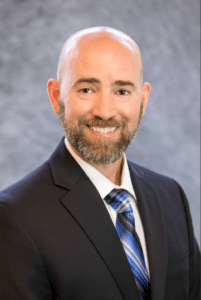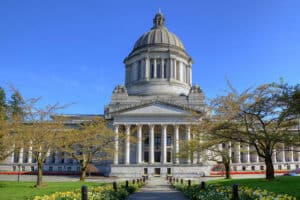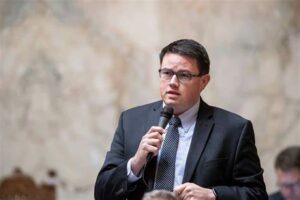Shift presents a special Newsmaker Interview with Jason Mercier, Washington Policy Center’s Director of the Center for Government Reform. Unfortunately this is an “exit interview” since it was recently announced that he will soon become the Vice President of the newly formed Mountain States Policy Center, a regional think  tank focused on Idaho, Montana, Wyoming, and occasionally Eastern Washington. Over the past few years, Jason has undoubtedly been the most quoted individual in Shift, primarily due to his outstanding work analyzing the Democrats’ state income tax on capital gains. It was Jason’s work which discovered that the Internal Revenue Service and each of the other 49 states all define a tax on capital gains as a tax on income and this one that should be unconstitutional in our state. Unfortunately, seven liberal judges on the Washington State Supreme Court decided to disregard this universally accepted definition, and a century of judicial precedent, to side with Democrat lawmakers, who will likely use this court decision to implement many new taxes to fund the rapid growth and cost of Washington State government (which has more than doubled in cost during the past decade).
tank focused on Idaho, Montana, Wyoming, and occasionally Eastern Washington. Over the past few years, Jason has undoubtedly been the most quoted individual in Shift, primarily due to his outstanding work analyzing the Democrats’ state income tax on capital gains. It was Jason’s work which discovered that the Internal Revenue Service and each of the other 49 states all define a tax on capital gains as a tax on income and this one that should be unconstitutional in our state. Unfortunately, seven liberal judges on the Washington State Supreme Court decided to disregard this universally accepted definition, and a century of judicial precedent, to side with Democrat lawmakers, who will likely use this court decision to implement many new taxes to fund the rapid growth and cost of Washington State government (which has more than doubled in cost during the past decade).
In his interview, Jason shares with Shift readers his departing thoughts after 23 years of being a policy analyst of the Washington State government and its budgets. He identifies the best and the worst policies which have been enacted during the past quarter of a century. Jason also shares who will follow him at the Washington Policy Center.
From all of us at Shift… Thank you Jason for your excellent work and we wish you the best in your new role at the Mountain States Policy Center.
After 23 years as a policy analyst for the Washington State Legislature (16 years with the Washington Policy Center), you have accepted a position with the new Mountain States Policy Center. Please tell us about MSPC and what you will be doing in your new role.
 I’m excited to get the band back together with my longtime friend and former colleague Chris Cargill. Chris started Mountain States Policy Center (MSPC) about a year ago to help provide non-partisan, quality research that promotes free enterprise, individual liberty and limited government on a regional basis focusing primarily on Idaho, Montana, Wyoming and some Eastern Washington. Chris made me an offer I couldn’t refuse to be the Vice President and Director of Research for MSPC. I had the opportunity to make brief remarks at MSPC’s first major dinner event on April 28 and made my commitment to always make policy recommendations based on facts – not emotion.
I’m excited to get the band back together with my longtime friend and former colleague Chris Cargill. Chris started Mountain States Policy Center (MSPC) about a year ago to help provide non-partisan, quality research that promotes free enterprise, individual liberty and limited government on a regional basis focusing primarily on Idaho, Montana, Wyoming and some Eastern Washington. Chris made me an offer I couldn’t refuse to be the Vice President and Director of Research for MSPC. I had the opportunity to make brief remarks at MSPC’s first major dinner event on April 28 and made my commitment to always make policy recommendations based on facts – not emotion.
You have literally provided analysis on hundreds of pieces of legislation during your time observing Olympia lawmakers. In your opinion, what was the best and worse legislation which were signed into law?
A lot has changed during the last 20 years for Washington budget policy – unfortunately not for the better. Perhaps the biggest impacts were two state Supreme Court rulings. The first was a 6-3 ruling in 2013 that invalidated the six-time voter approved requirement for tax increases to receive a supermajority vote for legislative approval. Prior to that court ruling the first response of the Governor and legislature was to look for budget efficiencies instead of tax increases.
That type of budget discipline led to landmark budget reforms like former Governor Locke’s Priorities of Government (POG) fiscal process. It also resulted in former Governor Gregoire creating a Fiscal Responsibility and Reform Panel to look for budget reforms. Gregoire actually appointed me to that panel and turned the podium over to me during a press conference to answer questions about our recommendations.

Since that voter-approved tax restriction was removed by the courts in 2013, however, the default position of the Governor and legislature has been to increase taxes. This is something that has consistently occurred despite this promise from then candidate Jay Inslee in 2012, “I would veto anything that heads the wrong direction and the wrong direction is new taxes in the state of Washington.”
The other major change to the state’s fiscal outlook occurred earlier this year when the state Supreme Court in a 7-2 decision ruled that it knows something that the rest of the world doesn’t – a capital gains tax isn’t really an income tax. Despite the supposed tax expertise of WA’s justices, the rest of the world disagrees and as a result national rankings and publications no longer list the state as being income tax free. Unless the voters act, expect to see this income tax door swing open wider in the coming years.
As for positive developments, I was happy to play a role in 2008 in bringing the state a searchable budget website (www.fiscal.wa.gov) and even though it took 15 years to advance for the Governor to recently sign a budget proviso setting up a planning process to create a tax transparency website to help remove some of the mystery surrounding the state’s more than 1,800 taxing districts.
If you could change one aspect of the state’s lawmaking process, what would you alter?
I can’t boil down 23 years of recommendations into just one thing so I’ll give you my dream list: Adopt a constitutional amendment restoring a supermajority vote for tax increases, reform the abuse of referendum-killing emergency clauses, put into statute legislative transparency protections (public notice, waiting periods, title-only bill bans) and provide the voters the eleventh opportunity to again reject an income tax by putting a constitutional amendment on the ballot stopping all income tax games.

Finally, please tell us about who will be replacing as the WPC Director of Government Reform?
WPC’s Center for Government Reform is being left in the more than capable hands of Chris Corry. Chris has more than eighteen years of experience in the insurance industry and risk management. As a Washington State Representative, he represents West Yakima County and all of Klickitat County. Chris was recently elevated to ranking member on the House Appropriations Committee. In his community he serves on a number of boards including Crime Stoppers of Yakima County, Central Washington State Fair Board and the Yakima Salvation Army Advisory Board. I can’t imagine leaving this position with someone better. Corry is one of a handful of people in this state whose grasp of budget and policy issues I have absolute confidence in.
One final thought just for old times’ sake, a capital gains tax is an income tax.
To learn more about the Mountain States Policy Center, please visit its website.
To keep informed on Washington State issues, please visit the Washington Policy Center’s website.




